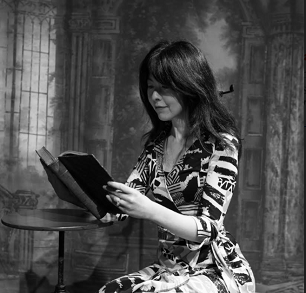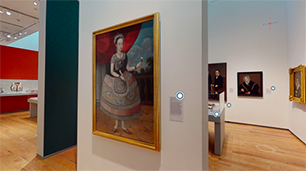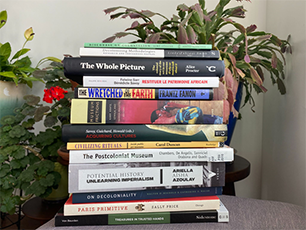From the Fellow: The Social Responsibility of Museums
By Arthurina Fears, Curator of Education and Programs, Davis Museum at Wellesley College

Arthurina Fears (she/her) is the 2020/21 NEMA Fellow. As part of the fellowship Arthurina is writing a series of articles for the NEMA community.
The ways in which museums serve a range of audiences is wide reaching--yet, are museums truly welcoming spaces? Do museums prioritize objects above museum visitors? Are our communities supported, and do they feel that the museum is a space for them and a place in which they are invited? Is this relationship one-sided, or is it a participatory process? Furthermore, do our communities see themselves represented, and what opportunities allow for their voices to be acknowledged and amplified?
As sites of social interaction and spaces, museums can support meaningful, transformative experiences, connection, and lifelong memories. Many museums are sites of care, advocate for important causes, and seek ways to support the public, such as going out into the community through food distribution sites or providing art supplies for children during the pandemic, and others might serve as polling sites. At my institution, the Davis Museum at Wellesley College, one translation of care is through an ongoing art and wellness initiative, including a program which incorporates mindfulness and fosters self-care and well-being with support of mental health professionals.
However, museums can be intimidating spaces, oftentimes seen as elitist institutions, particularly with “inherited legacies of racism and colonialism.” In the past year alone, there has been much trauma in our society with racial injustice and a surge in hatred and violence towards AAPI communities. What happens when museums are silent?
As centers of learning, how can museums hold themselves accountable for diversity, equity, accessibility, and inclusion--and contribute to social change? How can we truly support and care for our communities? At the Davis, we approach our work at our academic museum through a DEAI lens and have committed to learning, listening, and action to make the Davis a welcoming place. This applies to all of our work: from acquisitions to playdates, and from virtual tours to scholarly events.
A DEAI working group and action plan was formed at the Davis last spring, focusing on social justice and anti-racism. Lisa Fischman, Ruth Gordon Shapiro '37 Director of the Davis, states,
“Diversifying the Davis Museum’s program through acquisitions and exhibitions of work by BIPOC makers has been a major goal since my arrival at Wellesley in 2010. But our current cultural circumstances—the pandemic, with its disproportionate impact on Black and brown communities; along with the calls to action in response to the murder of George Floyd in Minneapolis, and attacks on AAPI communities—have redoubled the urgency and honed the focus of our work. The need for a DEAI Working Group, as a collaborative, inclusive, staff-centered endeavor became clear in early spring 2020 and Davis staff rose to the challenge. Amidst the overdue reckoning sweeping the museum field that foregrounds institutional legacies of systemic racism and colonialism, the Group is also key to identifying and redressing inequity at all levels of Davis operations—and to ensuring accountability. Through full staff participation, the DEAI Working Group has developed an Action Plan and a website where it will live—with the goal of creating generative opportunities to learn from our communities and to transform the Davis of the future. We are, all of us, deeply committed to this work.”
Our work through a transparent DEAI lens, for both our campus and wider audiences, includes focusing on social justice and also the overall well-being of our communities during this traumatic and tumultuous time in our society, from the pandemic to racial injustice and rise in hatred. We see the Museum as a place for all and a source of inspiration, solace, and calls for action.

Virtual Latinx tour: screenshot of the Davis in 3-D
For instance, our Student Guide and Student Visitor Assistant training has emphasized anti-racism, equity, inclusion, and accessibility throughout the COVID-19 crisis. Regina Gallardo, class of 2023, is a Davis Student Guide, events and programs assistant, member of our student advisory council, and is currently a summer intern. She says,
“For Wellesley’s Latinx Heritage Month, I guided an online tour about Latin American art found at the Davis. I included a Pre-Columbian sculpture as an object on my tour. As a programs and events assistant I’ve learned the importance of honoring and acknowledging the indigenous land on which the museum stands during public programming. Usually before our student guide tours we didn’t give a land acknowledgment, we usually jumped right into our tours. For this tour however, I knew I wanted to give a land acknowledgment. Although the object was not from the culture I was giving the land acknowledgment for I felt it was necessary. I think that as representatives of the museum it is important to honor the indigenous land we occupy. This is a practice I will continue doing at the beginning in my tours. I am happy that my training at the Davis has allowed me to see the importance of this practice. It is important that when we do it we also teach our audiences the importance of it as well.”
Our students have thoughtfully explored how to approach their tours and projects through a DEAI lens, from the choice of objects and artists, the inclusive language they use, the stories they wanted to share, incorporating voices and meaningful contributions, and acknowledging museum visitors’ experiences and perspectives.
This past fall, I restructured the Student Guide and Student Visitor Assistant training to focus on virtual visitor engagement and in which the students learned how to create virtual tours, developed content for online resources and delivered digital content for a range of audiences, including pre-recorded videos and video editing, captioning, an alt-tag project for images on the Davis website, and the hosting of live-streamed events, in addition to working on several other projects focusing on community building and the incorporation of shared, tactile experiences via distance. The students were deeply engaged in many aspects of museum work at the Davis and joined us in examining how to best care for our communities.
In the article On the Limits of Care and Knowledge: 15 Points Museums Must Understand to Dismantle Structural Injustice, Yesomi Umolu, Director of Curatorial Affairs and Public Practice at the Serpentine Galleries in London, calls for a re-envisioning of museums’ roles in society and advocates for actionable steps museums can take in anti-racism and decolonization from within and dismantling the prioritization of objects over community. The article emphasizes how the traumas of the past year have necessitated the need for museums to pursue actionable care.

Decolonial Reading Session Material. Photo credit: Amanda Gilvin, Davis Museum at Wellesley College
Over the past year, Davis staff, Wellesley students, and faculty have participated in a series of drop-in decolonial reading sessions, including real-world case studies, organized by Amanda Gilvin, Sonja Novak Koerner '51 Senior Curator of Collections and Assistant Director of Curatorial Affairs. What exactly does it mean to decolonize the museum? Amanda Gilvin says, “At the Davis, we understand decolonization as an active, collaborative process that requires rigorous scholarly and curatorial work. At four virtual reading sessions this year, Wellesley faculty, staff, and students convened to read and discuss decolonial theory related to museums. This was an important venue for all of us to learn together from both the readings and from one another. In April, we hosted a virtual panel on specific decolonial strategies and goals being undertaken at other academic museums in order to demonstrate multiple ways to transform theory into praxis.” The Davis will continue hosting decolonial reading sessions during the 2021-2022 school year, as it launches other related initiatives.
In fact, the panel Amanda describes, Decolonizing the Academic Art Museum: Goals and Strategies, drew close to 600 virtual attendees from around the nation from museums with “unique challenges--and opportunities--during this important moment of activism, as people who visit museums and people who work at museums seek anti-racist, equitable, decolonial institutions that pursue social change, rather than uphold an unjust status quo.”
With what we have learned, especially this past year, there is much work to be done, but together we are working towards social change, while striving for transparency. It is important to build relationships, and at the Davis, we are working with our on- and off-campus partners on several initiatives and are also re-envisioning our student advisory committee so that an inclusive and diverse group of student ambassadors will be more closely integrated with the activities of the Museum and are empowered to become lifelong advocates of the arts.
In the fall, in addition to continuing the decolonial reading sessions, we will work with the College’s Office of Intercultural Education, which primarily supports first-generation college students and students of Asian descent, on a series of AAPI programming. This is particularly personal for me as a Korean-American, and we hope to use art as a tool to support students who are grappling with ongoing discrimination and violence.
Museums can be transformative spaces, and as NEMA Executive Director Dan Yeager’s statement on the NEMA website attests, “As key pillars of their communities, museums play an important role in helping make sense of life's challenges, contextualizing the news, and improving the circumstances of the people they serve. The great power of museums is their ability to transform the lives of individuals who walk through their doors. Their greater power, and fundamental duty in my opinion, is to act as agents of transformation to society as a whole.”
It is time to build relationships with the communities we strive to serve. We are trying to make sense of all that has transpired over the past year, and museums can be a beacon for transformative change. This is a time where we can learn from one another and our communities and work towards advocacy and social change. What happens when museums focus on people over objects? Is there a balance between the two? What steps will you take in making your museum a welcoming and equitable space?
Books pictured in Decolonial Reading Session Material photo:
Discourse on Colonialism by Aimé Césaire
Decolonizing Methodologies: Research and Indigenous Peoples by Linda Tuhiwai Smith
The Whole Picture: The Colonial Story of the Art in Our Museums & Why We Need to Talk About It by Alice Procter
Restituer le patrimoine africain by Felwine Sarr, Benedicte Savoy
The Wretched of the Earth by Frantz Fanon Museum Frictions: Public Cultures/Global Transformations Editors: Ivan Karp, Corinne A. Kratz, Lynn Szwaja, Tomas Ybarra-Frausto
Acquiring Cultures: Histories of World Art on Western Markets Editors: Bénédicte Savoy, Charlotte Guichard and Christine Howald
Civilizing Rituals: Inside Public Art Museums (Re Visions: Critical Studies in the History and Theory of Art) by Carol Duncan
The Postcolonial Museum: The Arts of Memory and the Pressures of History by Iain Chambers, Alessandra De Angelis, Celeste Ianniciello, Mariangela Orabona
Potential History: Unlearning Imperialism by Ariella Aïsha Azoulay
On Decoloniality: Concepts, Analytics, Praxis by Walter D. Mignolo, Catherine E. Walsh Paris
Primitive: Jacques Chirac's Museum on the Quai Branly by Sally Price
Treasures in Trusted Hands: Negotiating the Future of Colonial Cultural Objects by Jos van Beurden